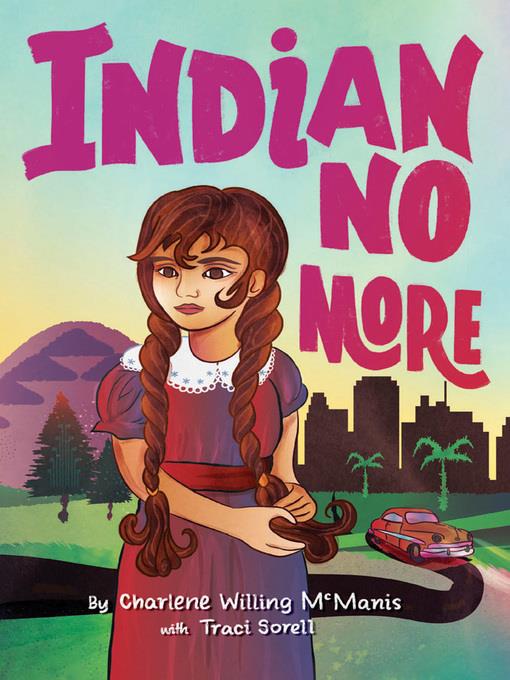
Indian No More
فرمت کتاب
ebook
تاریخ انتشار
2019
Lexile Score
720
Reading Level
3
نویسنده
Traci Sorellناشر
Lee & Low Booksشابک
9781620148402
کتاب های مرتبط
- اطلاعات
- نقد و بررسی
- دیدگاه کاربران
نقد و بررسی

September 16, 2019
Set in 1957, as the U.S. government’s Indian Relocation Program went into effect, this autobiographical novel was written by the late McManis, of Umpqua heritage and a formerly enrolled citizen of the Confederated Tribes of Grand Ronde, and completed after her death by Sorrell, an enrolled citizen of the Cherokee Nation. Ten-year-old Regina Petit’s family moves to Los Angeles after their Umpqua tribe, along with all Oregon tribes, is terminated. Displaced to a small house in a crowded neighborhood, the Petits—Daddy, Portuguese Mama, grandmother Chich, younger sister Peewee, and Regina—confront stereotypical views of Native Americans held by their new friends, including black, Latinx, and white people. Regina struggles with her Native identity as she experiences Halloween—during which a racist attack leaves her bewildered—and Thanksgiving for the first time. The authors’ depiction of valiantly optimistic Daddy as a man who is unwilling to be defeated by discrimination is especially strong; other characters, while sympathetic, have less dimension, and two significant family events are given little heft. A personalized look at a significant moment in U.S. history, the book closes with extensive back matter, including McManis’s author’s note and family photos. Ages 8–12.

Starred review from September 1, 2019
Gr 4-7-Regina Petit and her family are Umpqua, living on the Grand Ronde Tribe's reservation in Oregon, until the U.S. government enacts a law saying that her tribe no longer exists. Ten-year-old Regina can't comprehend what is happening to her family and how they can have their Indian heritage taken away from them. Forced to move with her parents, grandmother, and younger sister, PeeWee, to Los Angeles, Regina finds her world turned upside down. Daddy believes that the 1957 Indian Relocation Program will provide their family with a home, schooling, a good job, and opportunities, while Chich (Grandma) is more doubtful, calling their relocation an eviction. Mama tries to keep her chin up for her family, but she just wants to go back home. Regina and PeeWee try to acclimate to their new neighborhood and school but find ignorance and racism toward Indians prevalent. New friends Keith and Addie are a bright spot for the Petit children, but as black children, Keith and Addie also face racism. Daddy tries to put on a brave face for his family, working hard to get ahead, only to discover that education and hard work aren't necessarily enough. The family's struggles are not sugarcoated; readers see the reality of Daddy's despair and anger as Mama tries to hold the family together. In the midst of it all, Chich carries forward their tribal stories. In this book based on McManis's own childhood experiences, the family is fictionalized to show how older children might react to being uprooted and plopped down in a foreign world-McManis was one year old when the government declassified her family's tribe. McManis died before finishing the novel, entrusting Sorell to finish her story. A lengthy author's note from McManis offers relevant history with which readers may be unfamiliar, along with family photos from this time. Also discussed in the note is the relevance of President Ronald Reagan changing the laws in 1983, enabling the restoration of tribes that had been terminated. VERDICT Readers will be moved as they become invested in Regina's predicament. Is she still Indian, American, or both-and what does that mean for her and her family?-Michele Shaw, Quail Run Elementary School, San Ramon, CA
Copyright 2019 School Library Journal, LLC Used with permission.

August 1, 2019
In 1954, the Umpqua tribe was terminated by the government. Unable to afford their land on the former Umpqua Grand Ronde reservation in Oregon, 10-year-old Regina Petit's father, who is Umpqua, decides to sign up for the Indian Relocation Program and move the entire family to Los Angeles. Regina and her little sister, Peewee, spend the summer adjusting to life in their multicultural South Central Los Angeles neighborhood, where they befriend black siblings Keith and Addie and Cuban brothers Anthony and Philip. In this new environment, Regina is forced to confront the dominant ideas about her Indian identity through what the other kids have learned at school and from the 1950s TV show The Lone Ranger. A neighborhood game of Cowboys and Indians defies the outcome Regina played on the rez, where the Indians win. The children experience a racist attack while trick-or-treating when white teenagers throw eggs and use the N-word. (The book leaves Regina puzzling over this incident without addressing the history or implications of the slur.) McManis and Sorell produce a poignant family story of the impact termination had on the thousands of Native Americans who left reservations in order to survive. Using a supporting cast of color to reflect distorted stereotypes back at them, however, has the effect of eliding the implication of white culture in their origins. A good starting point to introduce the legacy of tribal termination. (Historical fiction. 8-12)
COPYRIGHT(2019) Kirkus Reviews, ALL RIGHTS RESERVED.

























دیدگاه کاربران